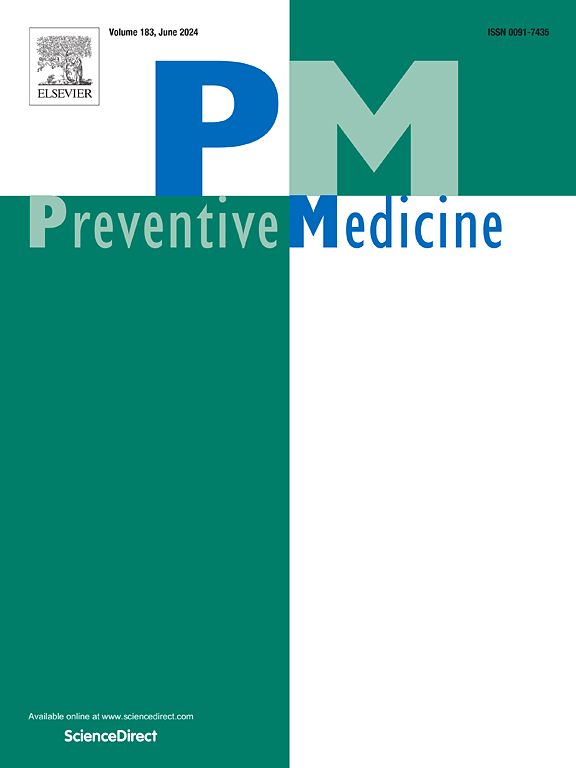Psychological distress as a risk factor for incident cardiometabolic disease and multimorbidity in the population-based Tromsø Study in Norway
IF 3.2
2区 医学
Q1 MEDICINE, GENERAL & INTERNAL
引用次数: 0
Abstract
Objective
It is unclear whether psychological distress is an independent risk factor for cardiometabolic disease and multimorbidity. This cohort study investigated the relationship of psychological distress with incident cardiometabolic disease and multimorbidity.
Methods
All individuals who participated in the sixth survey of the Tromsø Study, conducted in Norway in 2007–2008, and completed the 10-item version of Hopkins Symptom Checklist (HSCL-10) were included. In total, 5264 individuals who had no cardiometabolic diseases, i.e. atrial fibrillation, coronary artery disease (CAD), diabetes, hypertension, and stroke, at baseline, and participated in the seventh survey (2015–2016) were included in the final study population. Multivariable logistic regression models were fitted to assess association of HSCL-10 score and clinically relevant psychological distress (HSCL-10 ≥ 1.85) with cardiometabolic disease and multimorbidity.
Results
At baseline, 325 (6.2%) individuals had psychological distress. Psychological distress was negatively correlated with higher education, exercise frequency, and systolic blood pressure and positively correlated with smoking and alcohol use. Incidence of cardiometabolic disease and multimorbidity was 23.7% (N = 1246) and 3.9% (N = 204), respectively. Psychological distress was linked to cardiometabolic disease (OR, 2.08; 95% CI, 1.56–2.76) and multimorbidity (OR, 2.32; 95% CI, 1.32–4.08). Furthermore, psychological distress was associated with incident atrial fibrillation, diabetes, and hypertension whereas no significant association was found with CAD and stroke. Among the psychological distress symptoms, feeling hopeless about the future was associated with incident atrial fibrillation, hypertension, and CAD.
Conclusions
Our findings emphasize psychological distress as an independent risk factor for cardiometabolic disease and multimorbidity.
挪威基于人群的特罗姆瑟研究:心理困扰是心血管代谢疾病和多发病的危险因素
目的目前尚不清楚心理困扰是否是心脏代谢疾病和多病症的独立风险因素。这项队列研究调查了心理困扰与心血管代谢疾病和多病发生之间的关系。方法纳入所有参加了2007-2008年在挪威进行的特罗姆瑟研究第六次调查并填写了10项霍普金斯症状检查表(HSCL-10)的人。共有5264人在基线时未患有心血管代谢疾病,即心房颤动、冠状动脉疾病(CAD)、糖尿病、高血压和中风,并参加了第七次调查(2015-2016年),这些人被纳入最终研究人群。研究人员拟合了多变量逻辑回归模型,以评估 HSCL-10 评分和临床相关心理困扰(HSCL-10 ≥ 1.85)与心脏代谢疾病和多病症的关系。心理困扰与受教育程度、运动频率和收缩压呈负相关,与吸烟和酗酒呈正相关。心脏代谢疾病和多病发生率分别为 23.7%(N = 1246)和 3.9%(N = 204)。心理困扰与心脏代谢疾病(OR,2.08;95% CI,1.56-2.76)和多病(OR,2.32;95% CI,1.32-4.08)有关。此外,心理困扰与心房颤动、糖尿病和高血压的发生有关,而与冠状动脉硬化和中风则无明显关联。在心理困扰症状中,对未来感到绝望与心房颤动、高血压和 CAD 的发生有关。
本文章由计算机程序翻译,如有差异,请以英文原文为准。
求助全文
约1分钟内获得全文
求助全文
来源期刊

Preventive medicine
医学-公共卫生、环境卫生与职业卫生
CiteScore
7.70
自引率
3.90%
发文量
0
审稿时长
42 days
期刊介绍:
Founded in 1972 by Ernst Wynder, Preventive Medicine is an international scholarly journal that provides prompt publication of original articles on the science and practice of disease prevention, health promotion, and public health policymaking. Preventive Medicine aims to reward innovation. It will favor insightful observational studies, thoughtful explorations of health data, unsuspected new angles for existing hypotheses, robust randomized controlled trials, and impartial systematic reviews. Preventive Medicine''s ultimate goal is to publish research that will have an impact on the work of practitioners of disease prevention and health promotion, as well as of related disciplines.
 求助内容:
求助内容: 应助结果提醒方式:
应助结果提醒方式:


